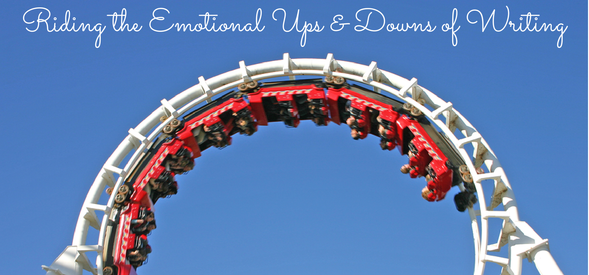 Note from Jenna: This guest post from one of my screenwriting colleagues and best friends, Isabel Holtreman. Isabel is a talented writer and is one of my most trusted feedback sources, both for my writing itself and for emotional support around the challenges of writing. I’m thrilled she was willing to take the time to talk with us today about navigating the emotional ups and downs of writing, and how she does it.
Note from Jenna: This guest post from one of my screenwriting colleagues and best friends, Isabel Holtreman. Isabel is a talented writer and is one of my most trusted feedback sources, both for my writing itself and for emotional support around the challenges of writing. I’m thrilled she was willing to take the time to talk with us today about navigating the emotional ups and downs of writing, and how she does it.
Be sure and leave a comment at the end of the post and let us know what inspired you.
How to Ride the Emotional Roller Coaster of Being a Writer
by Isabel Holtreman
I’m in marketing mode. I’ve never really taken marketing seriously until now, but it’s that time — the time where you realize that you must push yourself out of the realm of amateur and finally go pro.
Over the past few weeks, I’ve noticed some emotions coming up around where I am in my writing career:
- I miss working on story, something I can’t seem to do while I’m marketing. It engages a different part of my brain.
- I feel like an imposter, like at any moment, someone will find out that I’m not a writer at all, but some big fake who’s trying to fool the world.
- I’m elated when someone asks to read my work, but am devastated when a few days go by without a request.
I experience a similar thing when I’m in writing mode:
- I feel like I should be marketing something, because if I don’t, I’ll never make any money as a writer which will negate my newly acquired professional status.
- I feel like an imposter, like at any moment, someone will find out that I’m not a writer at all, but some big fake who’s trying to fool the world.
- I’m elated when story is flowing and everything is clicking, then devastated when I get stuck or can’t find a way to solve a story problem.
Does any of this sound familiar?
I’m sure it does. Being a writer is hard work. And I’m not just talking about the work itself. It’s difficult to stay even, to function in society, to not allow ourselves to fall into the pit of despair, and keep ourselves from paralyzing.
So, how do we deal with this emotional roller coaster without driving ourselves or our loved ones insane?
And perhaps even more importantly, without giving up on the dream?
Well, once again, we have to be willing to hunker down and do the work. Whether you decide to do the work on paper as I do (or on a computer) and journal, or decide to talk to someone, the fact is, the emotions must be acknowledged, brought to the surface, and observed for all they really are: Feelings.
Feelings are not ultimate truths.
They are simply clues, little alarms that lead us to overcoming our fears, and it’s our job to allow the feeling to flow, jump into our logical minds and say “Oh. Wow. There’s that feeling again. Okay, it’s just a feeling,” then take a step, ANY STEP toward overcoming it and moving forward.
Here are a few tips that have worked for me:
- Cry. I know, I know. It seems counter-intuitive, but it’s a quick way to get the feelings out. Set a timer and cry for 5 minutes, then wipe your eyes and write a sentence. It doesn’t matter whether it’s in a journal or novel or script. The act of writing breeds more writing.
- “It’s just a feeling, it’s not truth.” I repeat this phrase to myself a lot. It helps to help put feelings into perspective and understand that an emotion is just an emotion, a temporary, fleeting thing and that it doesn’t have to stop me.
- Give yourself a break. There’s no use trying to power through if your emotions are overpowering you. For those minutes or hours when you’re feeling at your lowest, step away from the work and connect to your heart, your humanity. Playing with a child, going for a walk, kissing a spouse, getting a hug — all these things put our lives into perspective and help us to realize that writing is what we do and not who we are.
- Journal. This has been the single most effective tool I’ve used for dealing with my emotions, period. Allow your feelings to flow on paper or on your computer for as long as you need, then ask yourself this question: “How can I turn this around?” With a little practice, you’ll find a ray of hope that will pull you out of your fear, anger or sorrow.
All of these tools do one very important thing: they teach us how to step back, observe, and process emotions while we’re still feeling them, which almost immediately reduces their power over us.
The roller coaster of emotions will always be part of the writer’s life, but with a little perspective and a few good tools, we can minimize the ups and downs, find a little peace, and get back to work.
![]()
Isabel Holtreman is an optioned screenwriter and consultant with a master’s degree in screenwriting from Cal State.
![]()
Thanks for reading!
We’d love to hear your thoughts in the comments.
Warmly,


